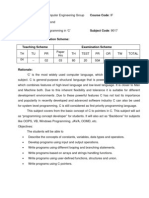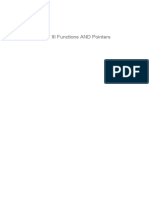Course Profile Computer Programming
Uploaded by
Sajid HussainCourse Profile Computer Programming
Uploaded by
Sajid HussainINSTITUTE OF INDUSTRIAL ELECTRONICS ENGINEERING, PCSIR,
KARACHI
Program BE (Industrial Electronics Engineering)
Course Profile
COURSE CODE & TITLE SEMESTER CREDIT HOURS
IE125 COMPUTER PROGRAMMING SPRING FALL TH 3 2 1 0
PR 3 2 1 0
PREREQUISITE COURSE(S) DATE OF COURSE APPLIED FROM
NIL CONTENT APPROVAL BATCH
05-09-2023 2023
COURSE CONTENTS
Introduction to Programming: Basic Structure of a Program, Data Types, Variables and Constants, Basic library
Functions.
Control Flow and Decision Making: Conditional Statements: if, else-if, and switch, Loops: for, while, and do-
while, Controlling Loop Execution with break and continue.
Functions and Modular Programming: Types of user-define Functions, Passing Arguments: Call by Value vs. Call
by Reference, Scope and Lifetime of Variables.
Arrays and Pointers: Declaring and Using Arrays, Pointers: Address and Dereferencing, Dynamic Memory
Allocation, Multi-dimensional Arrays and Pointers.
Structures and Unions: Defining and Using Structures, Nesting Structures and Arrays within Structures,
Introduction to Unions: Memory Optimization.
Introduction to Object-Oriented Programming: Understanding OOP Principles and Benefits, Emulating Objects
using Structures, Encapsulation: Data Hiding and Abstraction.
Functions and Pointers in OOP: Function Pointers: Creating Callbacks, Polymorphism in C: Function Overriding.
Creating Classes: Designing Classes: Data Members and Member Functions, Implementing Constructors and
Destructors, Public and Private Members within a Class.
Inheritance and Reusability: Achieving Inheritance through Structures, Using Function Pointers for Inherited
Functions.
Polymorphism and Interfaces: Polymorphism with Function Pointers, Creating Interfaces: Defining Function
Signatures.
COURSE LEARNING OUTCOME AND ITS MAPPING WITH PROGRAMME LEARNING OUTCOME
Programme learning
Sr. No. CLOs Taxonomy level
outcome (PLO)
Upon successful completion of the course, the student will be able to:
PLO – 01
1 Apply skills and concepts of programming. C – 03
Engineering Knowledge
PLO – 03
Develop applications using object oriented
2 C – 05 Design / Development of
programming techniques.
Solutions
LAB LEARNING OUTCOME AND ITS MAPPING WITH PROGRAMME LEARNING OUTCOME
Programme learning
Sr. No. CLOs Taxonomy level
outcome (PLO)
Practice Programming concepts for building PLO – 12
1 lifelong Programming skills. P – 03
Lifelong Learning
REMARKS (if any):
Page:38
You might also like
- B. Tech. + M. Tech. - Artificial Intelligenc Robotics (Syllabus) 2018No ratings yetB. Tech. + M. Tech. - Artificial Intelligenc Robotics (Syllabus) 2018114 pages
- CSE 115 - 115L Course Objective and OutcomeNo ratings yetCSE 115 - 115L Course Objective and Outcome6 pages
- Computer Programming CP Course Plan SpringNo ratings yetComputer Programming CP Course Plan Spring6 pages
- ICC 0102 Fundamentals of Programming (Lecture)No ratings yetICC 0102 Fundamentals of Programming (Lecture)5 pages
- OOP(CS-217) Course Outline Spring 2021 (BCS-2A)No ratings yetOOP(CS-217) Course Outline Spring 2021 (BCS-2A)3 pages
- Programming in C (CSE18R153) : School of Computing Departement of Computer Science and EngineeringNo ratings yetProgramming in C (CSE18R153) : School of Computing Departement of Computer Science and Engineering14 pages
- COMP1003 Object Oriented Programming 2021-2022No ratings yetCOMP1003 Object Oriented Programming 2021-20229 pages
- Computer Science C++ (083) Assignment Booklet Class Xii Academic Session: 2017-18No ratings yetComputer Science C++ (083) Assignment Booklet Class Xii Academic Session: 2017-18100 pages
- Programming in C (CSE18R153) : School of Computing Departement of Computer Science and EngineeringNo ratings yetProgramming in C (CSE18R153) : School of Computing Departement of Computer Science and Engineering14 pages
- Andhra Pradesh State Council of Higher EducationNo ratings yetAndhra Pradesh State Council of Higher Education32 pages
- UG - B.Com - Computer Applications - PRINCIPLES OF C PROGRAMMING-12332 - 9511No ratings yetUG - B.Com - Computer Applications - PRINCIPLES OF C PROGRAMMING-12332 - 9511149 pages
- NEP-B.Sc. (Computer Science) - Sem. I & II - (Syllabus)No ratings yetNEP-B.Sc. (Computer Science) - Sem. I & II - (Syllabus)17 pages
- Manipal University Jaipur: Object Orient C Programming - CA 1103 - 4 Credits - 3 1 0 4No ratings yetManipal University Jaipur: Object Orient C Programming - CA 1103 - 4 Credits - 3 1 0 47 pages
- C# Fundamentals Made Simple: A Practical Guide with ExamplesFrom EverandC# Fundamentals Made Simple: A Practical Guide with ExamplesNo ratings yet
- Midterm Exam STS 201, Tahan March 4, 2005: NameNo ratings yetMidterm Exam STS 201, Tahan March 4, 2005: Name5 pages
- Project Assignment Computer Science - Final - 2013 - VijayNo ratings yetProject Assignment Computer Science - Final - 2013 - Vijay17 pages
- Questions ForHomework Class 12th Computer Science 1 & 2No ratings yetQuestions ForHomework Class 12th Computer Science 1 & 23 pages
- D, The Best Programming Language, For Former Python Developers Learn D Programming For Python Developers (Victor Porton) (Z-Library)No ratings yetD, The Best Programming Language, For Former Python Developers Learn D Programming For Python Developers (Victor Porton) (Z-Library)333 pages
- Get Begin to Code with JavaScript 1st Edition Miles PDF ebook with Full Chapters Now100% (2)Get Begin to Code with JavaScript 1st Edition Miles PDF ebook with Full Chapters Now46 pages
- Immediate download JavaFX Developing Rich Internet Applications 1st Edition Jim Clarke ebooks 2024100% (1)Immediate download JavaFX Developing Rich Internet Applications 1st Edition Jim Clarke ebooks 202441 pages































































































